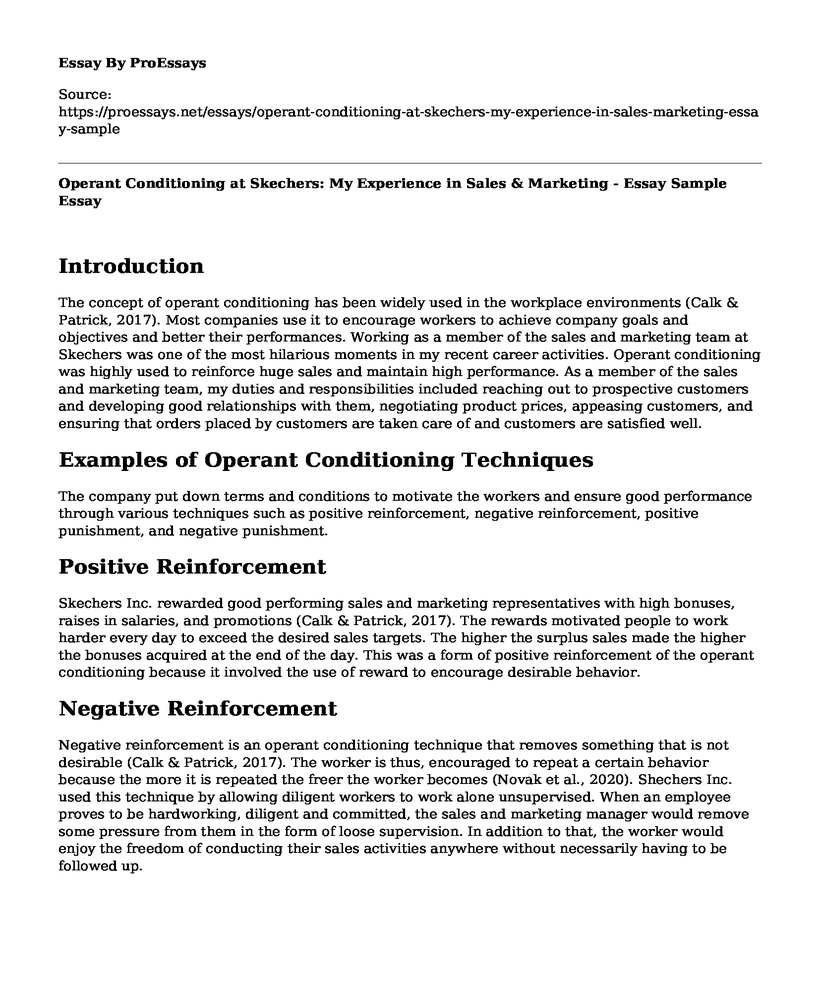Introduction
The concept of operant conditioning has been widely used in the workplace environments (Calk & Patrick, 2017). Most companies use it to encourage workers to achieve company goals and objectives and better their performances. Working as a member of the sales and marketing team at Skechers was one of the most hilarious moments in my recent career activities. Operant conditioning was highly used to reinforce huge sales and maintain high performance. As a member of the sales and marketing team, my duties and responsibilities included reaching out to prospective customers and developing good relationships with them, negotiating product prices, appeasing customers, and ensuring that orders placed by customers are taken care of and customers are satisfied well.
Examples of Operant Conditioning Techniques
The company put down terms and conditions to motivate the workers and ensure good performance through various techniques such as positive reinforcement, negative reinforcement, positive punishment, and negative punishment.
Positive Reinforcement
Skechers Inc. rewarded good performing sales and marketing representatives with high bonuses, raises in salaries, and promotions (Calk & Patrick, 2017). The rewards motivated people to work harder every day to exceed the desired sales targets. The higher the surplus sales made the higher the bonuses acquired at the end of the day. This was a form of positive reinforcement of the operant conditioning because it involved the use of reward to encourage desirable behavior.
Negative Reinforcement
Negative reinforcement is an operant conditioning technique that removes something that is not desirable (Calk & Patrick, 2017). The worker is thus, encouraged to repeat a certain behavior because the more it is repeated the freer the worker becomes (Novak et al., 2020). Shechers Inc. used this technique by allowing diligent workers to work alone unsupervised. When an employee proves to be hardworking, diligent and committed, the sales and marketing manager would remove some pressure from them in the form of loose supervision. In addition to that, the worker would enjoy the freedom of conducting their sales activities anywhere without necessarily having to be followed up.Positive Punishment
Positive punishment is another operant conditioning technique that was successfully applied at Skechers Inc. Working under control of the supervisor, a sales representative could be scolded every time they did something the boss did not desire. Immediate verbal scolding helped the employee to know that what they did was not desirable to the boss. Being that nobody likes to be scolded, they stopped repeating the same behavior (Calk & Patrick, 2017). At other times, when an employee messed up at work, the sales and marketing manager would call them privately for constructive criticism and issuance of a warning to stop their behavior. Warnings work best because no employee may be willing to lose their job. Knowing that they were under the employer’s radar stopped them from repeating certain behaviors that were undesirable to the company (Novak et al., 2020).
Negative Punishment
Negative punishment technique involves taking away what one wants when they do what is not desirable. It is a direct opposite to the negative reinforcement technique, which involves taking away what one does not want when they did something desirable. Skechers Inc. applied this technique successfully in various ways (Novak et al., 2020). For example, the company could suspend the anticipated promotion of an individual employee if they engaged in an undesirable activity. Suspension of the anticipated promotion served as a perfect form of negative punishment because the employee lost what they wanted due to an undesirable activity they have done (Calk & Patrick, 2017). As a result, the employee will try as much as possible to avoid engaging themselves in undesirable activities to avoid the obvious consequences.
References
Calk, R., & Patrick, A. (2017). Millennials through the looking glass: Workplace motivating factors. The Journal of Business Inquiry, 16(2), 131-139. http://161.28.100.113/index.php/jbi/article/view/81
Novak, M. D., Blackman, A. L., Erath, T. G., & DiGennaro Reed, F. D. (2020). Operant renewal of desirable behavior in a simulated workplace: A translational model. Journal of the Experimental Analysis of Behavior, 113(1), 172-186. https://onlinelibrary.wiley.com/doi/full/10.1002/jeab.566
Cite this page
Operant Conditioning at Skechers: My Experience in Sales & Marketing - Essay Sample. (2023, Aug 03). Retrieved from https://proessays.net/essays/operant-conditioning-at-skechers-my-experience-in-sales-marketing-essay-sample
If you are the original author of this essay and no longer wish to have it published on the ProEssays website, please click below to request its removal:
- The Elements of ROPE in the Case Attached
- Products and Pricing Essay
- Rolls-Royce's Marketing Strategy in Action Paper Example
- Apple Inc. Marketing Plan Paper Example
- Positioning: Create a Distinct Image for Your Brand - Essay Sample
- Essay on Product Introduction Stage: R&D, Financing, & Marketing Strategies
- Essay on Uncovering the Consequences of What We Buy and Make: Daniel Goleman's Ecological Intelligence







